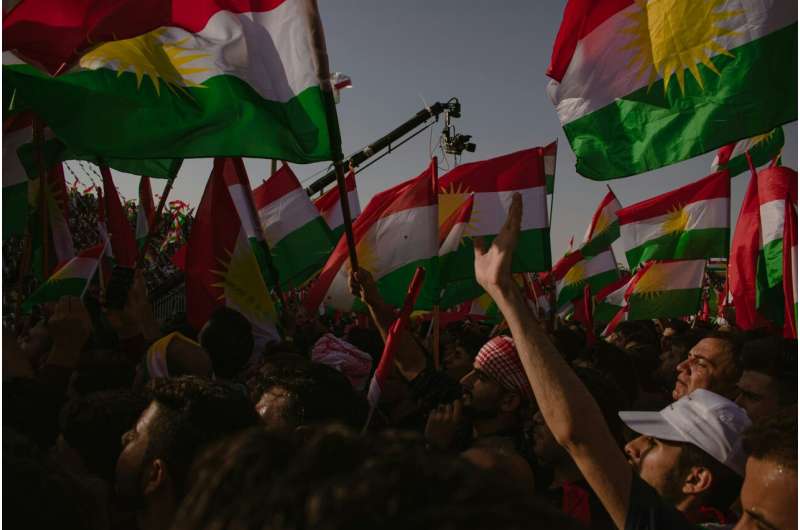This article has been reviewed according to Science X's editorial process and policies. Editors have highlighted the following attributes while ensuring the content's credibility:
fact-checked
trusted source
proofread
Kurdish uprisings have led to new ways for communities to claim Kurdish identity, study shows

Kurdish uprisings have become a way for people to assert their identity and challenge their historical and structural erasure in modern Iran, a new study shows.
Protests following the death of Jîna (Mahsa) Amini in police custody in Iran led to "remarkable" acts of resistance built on decades of activism, according to the research.
The study, published in the International Journal of Middle East Studies, outlines how the growing resistance that up to "Jîna's uprising" had been largely unnoticed by many Iranians.
Dr. Farangis Ghaderi, from the University of Exeter, who led the research, said, "The uprising opened a window onto the plight of Kurds and their long history of resistance. Jîna's murder sparked unprecedented solidarity among marginalized and oppressed peoples of Iran and offered an opportunity to reflect on their struggles, aspirations, and erased histories.
"The movement encouraged new solidarity, but silencing, marginalization, and erasures have continued in the mainstream Iranian media, at rallies, in commentaries and academic discussions. This includes people not using Amini's Kurdish name, Jîna, and the origin of the Jin, Jiyan, Azadî cry."
The study says media coverage of protests and commemorations has minimized or erased references to Kurdish political history and expressions of political and cultural demands.
Dr. Ghaderi said, "The protests have been vivid expressions of Kurdish identity—chanting of Kurdish slogans, singing of Kurdish revolutionary songs, and recitations of poetry—that have accompanied resistance and commemorations over the past year. Slogans, poems, and words uttered in eulogies and speeches brim with historical and political significance and situate the current uprising in the long history of the Kurdish struggle for recognition, equality, and justice."
At Jîna's funeral as well as other funerals over the past year, a Kurdish song, "Be Tenya Cêy Mehêllin" (Don't Leave Them Alone), has been sung. It is based on a poem written by the Kurdish poet Refîq Sabîr about Saddam Hussein's use of chemical weapons against civilians in Halabja in March 1988. Reference to violence against the Kurds by the state also was present in the statement published on August 24, 2023 by Jîna's family ahead of the first anniversary of her murder.
The study also shows how Kurds have continued to develop their language and culture and have found alternative ways through arts and literature to revive their memories and record. However, they have paid a heavy price for their resilience.
Although they constitute only 10 percent to 12 percent of Iran's population, they make up almost half of Iran's political prisoners. Mojgan Kavusi, a poet and language activist, was sentenced to sixty-two months and one day of imprisonment in December 2022, and Zara Mohammadi, a Kurdish language teacher and cofounder of the Nojin cultural organization, similarly sentenced to five years' imprisonment for teaching Kurdish in 2021.
More information: Farangis Ghaderi, Jin, Jiyan, Azadi and the Historical Erasure of Kurds, International Journal of Middle East Studies (2024). DOI: 10.1017/S002074382300137X
Provided by University of Exeter


















